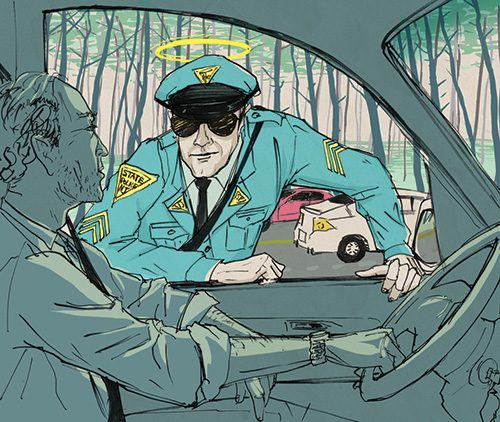
Recently, driving home from New Brunswick, where I work, to Morristown, where I live, I heard the sudden flap, flap, flap of a flat tire. I pulled to the side of Route 287. Anxiously, I got the jack out of my trunk and was trying to figure out how it worked when a state police cruiser pulled behind me, lights flashing. This made me even more anxious.
But the officer got out of his car and said, “Can I help you, sir?” I was surprised. I had never heard this question from a policeman before.
I have had a somewhat uneasy relationship with policemen ever since, at age 15, crossing a small, dark park, someone stepped out of the shadows and stuck a gun in my ribs. I was returning home from a Saturday afternoon movie. “Hands up,” he barked. Terrified, I complied, though a more natural response might have been to run for my life; I hadn’t yet made out that he was a policeman. Would he have shot me if I ran? Apparently a neighborhood jewelry store had been robbed, and the police had fanned out through the area accosting “suspicious-looking” passersby like myself. The cop patted me down, asked me what I was doing there, and then said, “You can go now, kid.” He didn’t apologize, and my ribs hurt for a week.
Ever afterwards, I have felt that there is something wrong with the relationship between citizens and the police in America. Police are public servants; they work for us. They should be unfailingly courteous and helpful. And we citizens should be exactly the same with them. Too often, however, there is an adversarial relationship: us versus them. And it cuts both ways. Should cars approaching you from the other direction flash their lights to warn you that there is a policeman up the road giving out speeding tickets? Without being a Goody Two-shoes about it, would it not be better for society, assuming one is speeding, that a ticket be issued?
That day, on the shoulder of Route 287, the state policeman and I worked together to jack up my car and replace the damaged tire with the donut.
“Anything else I can do for you, sir?” he asked.
In fact, there was. I explained that I didn’t have my cell phone. I had a very important appointment at home, and now I was late. “No problem,” the policeman said. He dialed the Morristown police and asked them to call my house and tell my wife that I was running 20 minutes late. She should tell my guest to wait.
I thanked him effusively. “That’s okay,” the officer said. “Just part of the job.”
I wondered whether it was; he seemed exceptionally nice and helpful. A few days later I phoned state police headquarters in Trenton and was told by the duty sergeant that what the officer had done was “normal protocol.” Perhaps, but I had never seen a policeman help a citizen in such a fashion. In fact, when the officer was about to drive off, I had leaned into his window and requested his name and badge number.
“Why do you want to know?” he asked, eyeing me warily.
“Because I’d like to write a letter of commendation,” I said, thinking he would be pleased. “Where would I send it?”
“If you don’t mind,” he replied, “I’d rather you didn’t.”
“Why?” I asked. “It’s the least I can do.”
He thanked me but said, “The guys at the barracks already think I’m a wimp. A letter from you would make things worse.” And with that he pulled onto the highway and was gone.
I don’t know which startled me more, his assistance or his unwillingness to let me acknowledge that help. He had demonstrated that there definitely are kindhearted cops and that the relationship between citizens and police need not be adversarial. But if the officers at the barracks think helping a citizen makes a cop a wimp, the problem isn’t going away any time soon. As for me, if trying to be kind and helpful makes you a wimp, sign me up.
Michael Aaron Rockland is professor of American Studies at Rutgers University. His latest book is a memoir, An American Diplomat in Franco Spain.



